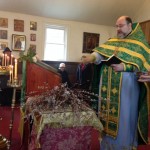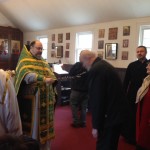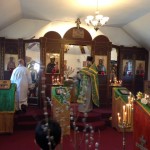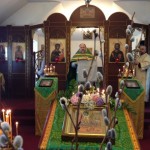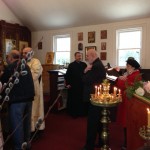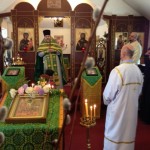On April 13, on Palm Sunday we had a solemn celebration of the feast of the Entry of our Lord Jesus Christ into Jerusalem. The Rector of St. George Church, Archpriest Igor Tarasov served the Divine Liturgy.
After the reading of the Hours the Rector blessed the pussy-willows and distributed them to the parishioners who were holding them during the service resembling the people of Jerusalem who greeted Jesus Christ with the olive and palm branches during His triumphal entry to the city.
Following the readings from the Scripture Fr. Igor preached a homily:
“Today is a great holy day of the Lord, His triumphal Entry into Jerusalem. It is a final celebration before we start mourning during the Passion week. It is a last bliss of joy we may have before we come to time of grief, before we begin to sympathize the Lord in His sufferings. This is why the message of today’s Epistle lesson is rather joyful. St. Paul exclaims, “Rejoice in the Lord always, again I will say, rejoice!” (Phil. 4, 4). He desires that we rejoice in the Lord and have no anxiety for anything.”
“When we hear these words of St. Paul we may feel like saying to him, “Come down to the earth! Who can live always rejoicing and without being anxious about anything? How can a mother with a sick child not be anxious? How can a person afflicted with cancer not be anxious? How can a business man at the time of economic crisis not be anxious?” But St. Paul says in today’s Epistle lesson: “Be anxious for nothing…” (Phil. 4, 6). And we should know that writing these words St. Paul was not thinking of some other world or some other life. When he wrote this advice he was having a pretty rough time himself. In fact, the words we heard today in the Epistle lesson were written when St. Paul was arrested, was probably in chains, and not in a comfortable chair in front of a fireplace. St. Paul was no armchair philosopher. He was a realist, well acquainted with life.”
“But if we read the whole advice of St. Paul in today’s Epistle lesson, we may see that he does not stop with these words. He goes on to teach us how to overcome anxiety. He says, “But in everything by prayer and supplication, with thanksgiving, let your requests be made known to God” (Phil. 4, 6). Bring your anxiety to God, he says. And he continues assuring us that if we do so “the peace of God, which surpasses all understanding, will guard your hearts and minds through Jesus Christ” (Phil. 4, 7). If we tell God about our worries, about our problems and troubles, He will guard our hearts and help us. The word ‘anxiety’ is derived from the Latin word meaning to choke. A thing is choked when the outlet is blocked. That is exactly what causes our anxiety. There is no outlet for our worries and fears. They back up on us, set our b=nerves twitching, and fill our days and nights with fear. But we Christians have an outlet. It is God’s compassion through our Lord Jesus Christ, the blessed one who comes in the name of the Lord.”
“St. Paul teaches us today to make our fears and worries known to God by prayer, supplication and thanksgiving. These are the ways of doing that.”
“Jesus was no stranger to anxiety. He was terrible anxious in the Garden of Gethsemane just before His crucifixion. We hear Him saying, “Now My soul is troubled… Father, save Me from this hour…” (Jn. 12, 27) “Take this cup away from Me…” (Lk. 22, 42). But Jesus was praying and here comes relinquishment: “Nevertheless, not My will, but Yours be done” (Lk. 22, 42). After relinquishment comes peace: “Father, forgive them, for they do not know what they do” (Lk. 23, 34) “Father, into Your hands I commit My spirit” (Lk. 23, 46). Therefore, dear brothers and sisters, Jesus Himself gave us a perfect example how we can commend our anxiety to God by prayer and supplication.”
“In addition, our anxiety can be commended to God by thanksgiving. A lady visited a priest one day. She had many troubles to tell him. He told her he would gladly listen provided she would first tell him all she has to be thankful for. She agreed and for a solid half hour gave her many reasons for being grateful. After she finished, the priest said, “Now you can tell me your troubles.” To her surprise the lady found herself saying, “I really don’t think I have any”. Thus, dear brothers and sisters, check your blessings, thank God for them, and when you are finished, you may be surprised to find that you are rather blessed than troubled.”
“The final cure for anxiety in today’s Epistle lesson is expressed by St. Paul when he tells us to fix our minds on whatever things are true, noble, just, pure, lovely, of good report and on any virtue and on anything praiseworthy (Phil. 4, 8). In other words, St. Paul calls us to think positive. In the midst of the storm of anxiety, fix your mind on Christ. Fix your mind on His power, on His love, on His great promises. Soak your mind with Christ and you will discover for yourself the true peace which surpasses all understanding, the peace of God the Lord who has appeared to us!”
For the first time in St. George Parish the Lord’s Prayer at this Liturgy was sung in the Georgian language. Since we have a family from Georgia among our parishioners the Rector blessed some occasional use of Georgian at our services.
After the Liturgy dismissal the Rector and altar servers came before the stand in the middle of the church and performed the rite of glorification before the festal image singing the troparia, the kontakion and the magnification of the feast.
The Rector congratulated the parishioners on the occasion of the holy day. He also reminded them that we are beginning Passion Week, a very important and spiritually intense time, and called to attend the services celebrated during that week.
After the service parishioners and the Rector enjoyed delicious meals and interesting conversation during the coffee hour.

